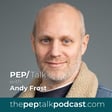
With Mark Meynell
One of the biggest reasons for people to reject Christianity is because of their experience of the Church or other Christians behaving badly. How can we deal with abuse of power, hypocrisy and loss of trust? In an age of scandal, misinformation and conspiracy theories how can we point people to the love, truth and safety of Jesus Himself? Andy and Kristi speak with author and pastor Mark Meynell about these incredibly important questions.
Mark Meynell is Director (Europe and Caribbean) for Langham Preaching (one of the 3 programmes of Langham Partnership). An ordained Anglican minister, he has served in churches in the UK (in Oxford, Sheffield and London) and taught (and for a year was Acting Principal) at a small seminary in Kampala, Uganda. He is married to Rachel and they have 2 grown-up children. He is currently working on a Doctor of Ministry (DMin) at Covenant Theological Seminary in St Louis, MO,
He is the author of Cross-Examined (IVP, 1998, 2010), Good Book Guide to Colossians (GBC, 2008), The Resurrection (10ofThose, 2013), What Makes Us Human? (GBC, 2015) He is passionately concerned to cross the bridge between the Bible’s world and the contemporary world, which led to A Wilderness of Mirrors. (Zondervan, 2015)
Support the show


















